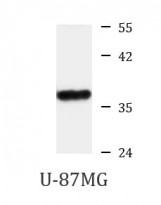ARG40460
anti-NACA1 + NACA2 antibody
anti-NACA1 + NACA2 antibody for Western blot and Human,Mouse,Rat
Overview
| Product Description | Rabbit Polyclonal antibody recognizes NACA1 + NACA2 |
|---|---|
| Tested Reactivity | Hu, Ms, Rat |
| Tested Application | WB |
| Host | Rabbit |
| Clonality | Polyclonal |
| Isotype | IgG |
| Target Name | NACA1 + NACA2 |
| Antigen Species | Human |
| Immunogen | Recombinant fusion protein corresponding to aa. 1-215 of Human NACA1 (NP_001106673.1). |
| Conjugation | Un-conjugated |
| Alternate Names | NACA1; Alpha-NAC, muscle-specific form; HSD48; skNAC; Nascent polypeptide-associated complex subunit alpha, muscle-specific form |
Application Instructions
| Application Suggestion |
|
||||
|---|---|---|---|---|---|
| Application Note | * The dilutions indicate recommended starting dilutions and the optimal dilutions or concentrations should be determined by the scientist. | ||||
| Positive Control | U-87MG | ||||
| Observed Size | ~ 38 kDa |
Properties
| Form | Liquid |
|---|---|
| Purification | Affinity purified. |
| Buffer | PBS (pH 7.3), 0.02% Sodium azide and 50% Glycerol. |
| Preservative | 0.02% Sodium azide |
| Stabilizer | 50% Glycerol |
| Storage Instruction | For continuous use, store undiluted antibody at 2-8°C for up to a week. For long-term storage, aliquot and store at -20°C. Storage in frost free freezers is not recommended. Avoid repeated freeze/thaw cycles. Suggest spin the vial prior to opening. The antibody solution should be gently mixed before use. |
| Note | For laboratory research only, not for drug, diagnostic or other use. |
Bioinformation
| Database Links |
Swiss-port # P70670 Mouse Nascent polypeptide-associated complex subunit alpha, muscle-specific form Swiss-port # Q13765 Human Nascent polypeptide-associated complex subunit alpha |
|---|---|
| Gene Symbol | NACA |
| Gene Full Name | nascent polypeptide-associated complex alpha subunit |
| Background | The protein encoded by this gene associates with basic transcription factor 3 (BTF3) to form the nascent polypeptide-associated complex (NAC). NAC binds to nascent proteins as they emerge from the ribosome, blocking interaction with the signal recognition particle (SRP) and preventing mistranslocation to the endoplasmic reticulum. However, nascent proteins with an exposed signal peptide will not be bound by the encoded protein, enabling them to bind the SRP and enter the secretory pathway. This protein has been determined to be an IgE autoantigen in atopic dermatitis patients. Several transcript variants encoding two different isoforms have been found for this gene. [provided by RefSeq, Oct 2011] |
| Function | Cardiac- and muscle-specific transcription factor. May act to regulate the expression of genes involved in the development of myotubes. Plays a critical role in ventricular cardiomyocyte expansion and regulates postnatal skeletal muscle growth and regeneration. Involved in the organized assembly of thick and thin filaments of myofibril sarcomeres (By similarity). [UniProt] |
| Cellular Localization | Cytoplasm. Nucleus. [UniProt] |
| Calculated MW | 205 kDa |
Images (1) Click the Picture to Zoom In






